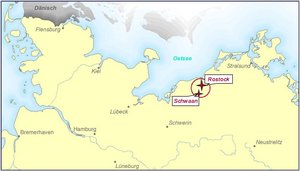
Contact Linguistic Investigation of the Linguistic Acculturation of Expellees in Mecklenburg
Research and coordination: Klaas-Hinrich Ehlers
Project time frame: 2013−2016

DFG-projekt at the Collegium Carolinum
In a case study of a specific region in the German federal state of Mecklenburg, the project will examine the consequences of the mass immigration of expellees for dialects and near-standard regional languages up to the present day.
This research project sheds light on an aspect of the complex process of expellee integration – linguistic acculturation – that has seldom been investigated in linguistics despite its significance for historical linguistics. In post-war Mecklenburg adaptation to the new linguistic situation by so-called ‘re-settlers’ was particularly evident in their acquisition of Low German and a one-sided structural advergence to the standard German spoken in Mecklenburg. A mutual convergence of allochthonous and autochthonous language varieties occurred to a far lesser extent in exchanges between established residents and immigrants.
To determine the precise degree of (mutual) linguistic acculturation, language tests will be carried out on witnesses to the immediate post-war years and samples of their speech will be recorded. These will then be quantitatively analysed to determine the presence of certain phonetic and morphosyntactic features. Only expellees from Middle and Upper German dialect regions (Silesia, Bohemia, Moravia, Slovakia, etc.) who could not have come into contact with Low German and the Northern German regional language before their expulsion will be tested. This will allow us to show linguistic contact constellations more clearly.

